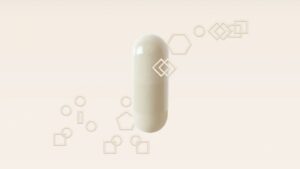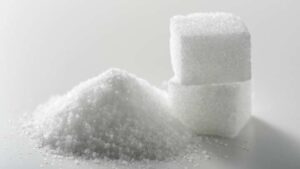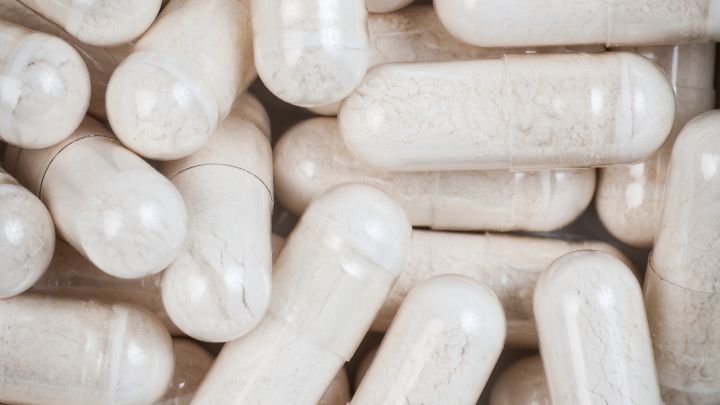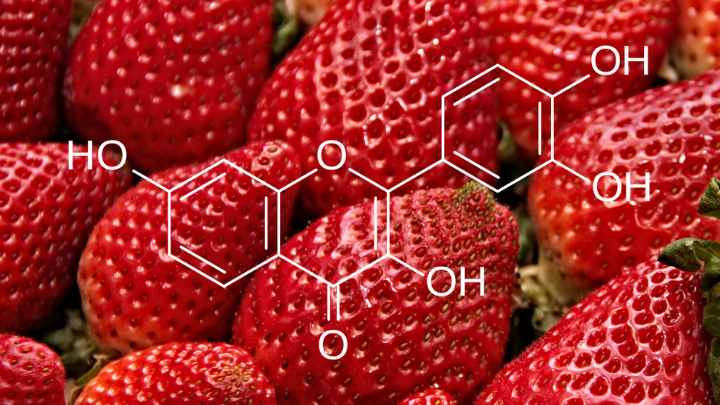Everyone is ageing. This biological process causes our cells to gradually lose their efficiency and vitality, affecting energy production, repair mechanisms, and metabolic regulation.
However, ageing isn’t linear, and not everyone ages at the same rate. As Einstein said, time really is relative. How you age depends largely on your lifestyle choices.
If you’re aiming to boost your longevity, you might have come across NMN and NAD+ supplements. The scientific names can be confusing, but understanding their roles is what matters.
NAD+ (Nicotinamide Adenine Dinucleotide) is a vital coenzyme in every cell, crucial for metabolism, DNA repair, and energy production. Unfortunately, NAD+ levels decline with age, leading to various age-related diseases.
NMN (Nicotinamide Mononucleotide) is a precursor to NAD+ that effectively boosts its levels, offering a potential way to combat age-related decline. Think of NMN as your healthy M&Ms.
In this Avea article, we’ll explore the importance of NAD+ for healthy ageing, the science behind NAD+ and NMN, and methods for testing your NAD+ levels.
NAD+ v.s. NMN: Which supplement wins for the most anti-ageing effects?
In this article
FREE anti-ageing guide

- Master the science of rejuvenation.
- Apply proven tips to turn back the clock.
- Transform your health with top longevity specialists.
Why do we need NAD+ for healthy ageing?
NAD+ (Nicotinamide Adenine Dinucleotide) is a coenzyme found in all living cells. It is crucial for maintaining cellular health, making it fundamental to the ageing process.
“NAD+ is the closest we’ve come to a fountain of youth,” says David Sinclair, co-director of the Paul F. Glenn Center for the Biology of Aging at Harvard Medical School.
“It’s one of the most crucial molecules for life, and without it, you wouldn’t survive more than 30 seconds.”
Discover Dr. David Sinclair’s anti-ageing supplements.
1. Metabolism
Firstly, NAD+ is integral to cellular metabolism. It acts as a coenzyme in redox reactions, critical for ATP production, the primary energy currency of your cells.
NAD+ helps transfer electrons in metabolic pathways such as glycolysis, the citric acid cycle, and oxidative phosphorylation, converting nutrients into energy efficiently. This energy is vital for all cellular activities, from muscle contraction to neuron firing.
Think of NAD+ as a helper molecule that facilitates chemical reactions in your body. It helps in converting the food you eat into usable energy.
Without NAD+, your cells wouldn’t be able to produce ATP, the energy that powers everything your body does.
Whether it’s your muscles moving, your brain providing thoughts, or your heart pumping, ATP is necessary. NAD+ ensures that your cells can keep producing this essential energy efficiently, keeping your body running smoothly.
With lower NAD+ levels, your cells struggle to generate enough energy, leading to decreased cellular function and vitality.
2. DNA repair
NAD+ also plays a significant role in DNA repair. It serves as a substrate for enzymes called sirtuins and poly(ADP-ribose) polymerases (PARPs), both involved in repairing damaged DNA.
As we age, DNA damage accumulates due to factors like UV radiation and oxidative stress. Efficient DNA repair mechanisms, supported by adequate NAD+ levels, are crucial for maintaining genomic stability and preventing mutations that can lead to cancer and other age-related diseases.
Think of NAD+ is like a repair kit for your DNA. It provides the necessary tools for specific enzymes to fix damage in your DNA.
3. Circadian rhythm
NAD+ regulates circadian rhythms, your body’s internal clock that dictates sleep-wake cycles and other physiological processes.
Sirtuins, which rely on NAD+, help control the expression of genes regulating circadian rhythms. Proper functioning of this internal clock is vital for overall health, influencing metabolism, hormone release, and even mood.
In a nutshell, NAD+ helps keep your body’s internal clock in sync. This clock manages not only your sleep patterns but also many other essential functions like hormone regulation and metabolic processes.
Sirtuins, dependent on NAD+, turn genes on and off to maintain this timing. Proper circadian rhythm regulation ensures that your body processes nutrients efficiently, releases hormones at the right times, and maintains stable moods, contributing to overall well-being.
4. SIRT1 activation
NAD+ activates sirtuins like SIRT1, which play a crucial role in metabolic regulation and stress responses. Sirtuins are a family of proteins that influence various metabolic processes.
SIRT1, in particular, affects insulin sensitivity, fat storage, and inflammation control. Without enough NAD+, SIRT1 can’t regulate these processes effectively, which can lead to metabolic imbalances and increased stress on your body.
Think of sirtuins as regulatory proteins that help manage how your body uses and stores energy. They ensure that insulin works properly, fat is stored correctly, and inflammation is controlled.
By keeping NAD+ levels high, you support SIRT1 activity, promoting better metabolic health and resilience to stress.
5. Immune function and inflammation control
NAD+ also helps modulate immune responses and control inflammation. Adequate levels of NAD+ are necessary for proper immune function, enabling your body to fight off infections and reduce chronic inflammation, a hallmark of ageing.
Basically, NAD+ is a crucial support system for your immune cells. It ensures they have the necessary tools to repair themselves, produce the right signals to manage inflammation, and generate enough energy to combat infections.
Without sufficient NAD+, your immune system becomes less efficient at fighting off pathogens and controlling inflammation. Chronic inflammation, a result of poor regulation, can damage tissues and organs, leading to diseases like heart disease, diabetes, and arthritis.
Reverse your age by 6.5 years like Ibrahim

- Explore the secrets behind Ibrahim’s transformation.
- Discover simple, proven strategies to improve vitality.
- Understand the role of supplements in reversing biological age.
NAD+ levels and ageing
NAD+ levels naturally decline with age. Sadly, this decline is exacerbated by lifestyle choices and environmental factors such as poor diet, lack of exercise, and exposure to pollutants.
Studies show that lower NAD+ levels can be linked to virtually all age-related diseases, including neurodegenerative diseases like Alzheimer’s, cardiovascular diseases, and metabolic disorders such as diabetes.
At the cellular level, less NAD+ means decreased cellular energy production, impaired DNA repair, and disrupted circadian rhythms.
Interventions aimed at boosting NAD+ levels, such as NMN supplementation, are actively researched for their potential to promote longevity and improve overall health.
Importance of NAD+: quick recap
NAD+ is essential for several critical functions:
- Energy production (ATP synthesis): Converts nutrients into ATP, the primary energy currency of cells.
- DNA repair and genomic stability: Supports enzymes that repair DNA damage, maintaining genomic integrity.
- SIRT1 activation and metabolic regulation: Activates sirtuins like SIRT1, which regulate metabolism and stress responses.
- Immune function and inflammation control: Modulates immune responses and reduces chronic inflammation.
- Circadian rhythm regulation: Helps regulate sleep-wake cycles and other physiological processes.
The science behind NMN
Why NMN supplementation became a thing
As scientists delved deeper into the ageing process, they discovered that declining NAD+ levels were a significant factor contributing to age-related decline.
Recognising the crucial role of NAD+ in cellular functions, researchers began exploring ways to replenish NAD+ levels.
Direct supplementation of NAD+ posed challenges due to its instability and poor bioavailability when taken orally. This led to the exploration of NMN (Nicotinamide Mononucleotide), a stable and bioavailable precursor to NAD+.
NAD+ v.s. NMN supplements: how they emerged
The quest to maintain or restore NAD+ levels gave rise to NMN and NAD+ supplements. Initially, NAD+ was administered intravenously to bypass the issues of oral supplementation, but this method was invasive and less practical for everyday use.
NMN, on the other hand, showed promise due to its ability to be absorbed and converted into NAD+ efficiently within the body.
This made NMN a more convenient and effective option for boosting NAD+ levels, leading to its popularity in the supplement market.
What is NMN?
NMN (Nicotinamide Mononucleotide) is a molecule found naturally in your body and in some foods. It’s made up of simple components: ribose (a type of sugar) and nicotinamide (a form of vitamin B3).
It is a direct precursor to NAD+ and plays a vital role in its biosynthesis. NMN supplements are designed to increase NAD+ levels in the body, thereby supporting the various cellular functions that rely on this essential coenzyme.
Double your NAD+ levels in 5 Months like Pascal

- Learn how Pascal achieved remarkable energy and longevity.
- Discover the vital role of NAD+ in energy production and longevity.
- Explore practical tips to enhance your own health and vitality.
Comparison between NAD+ and NMN supplements
Bioavailability
NMN
- Molecular size and structure: NMN is smaller and structurally simpler than NAD+, allowing for easier absorption through cell membranes, particularly in the small intestine.
- Conversion efficiency: Once NMN is absorbed into the bloodstream, it is rapidly converted into NAD+ by the enzyme nicotinamide phosphoribosyltransferase (NAMPT). This efficient conversion ensures that a significant portion of NMN is transformed into NAD+.
- Degradation: NMN is more stable in the digestive tract and less likely to be broken down before absorption, enhancing its overall bioavailability.
NAD+
- Poor oral absorption: NAD+ is a larger molecule, making it difficult to absorb through the digestive tract and prone to degradation by digestive enzymes, reducing its bioavailability.
- Intravenous requirement: To bypass absorption issues, NAD+ must be administered intravenously, which is effective but impractical for daily supplementation.
Stability
NMN
- Chemical stability: NMN is chemically more stable than NAD+, making it less susceptible to degradation from environmental factors such as light and heat. This stability helps maintain its potency during storage and use.
- Longer shelf life: The stability of NMN contributes to a longer shelf life, ensuring the supplement remains effective over time.
NAD+
- Chemical instability: NAD+ degrades quickly when exposed to environmental factors, reducing its effectiveness and shelf life.
- Challenges in formulation: Maintaining NAD+ stability in supplements is challenging, impacting its reliability and practicality.
Effectiveness
NMN
Efficient conversion: NMN is readily converted into NAD+ once absorbed, directly boosting NAD+ levels in the body.
Numerous animal studies and emerging human clinical trials have demonstrated the effectiveness of NMN supplementation.
Here are some key findings:
- Physical performance and sleep: NMN supplementation improves grip strength, walking speed, and overall muscle function, enhancing physical capabilities and sleep quality.
- Metabolic health: Research indicates NMN improves cardiometabolic functions, increasing insulin sensitivity and muscle glucose uptake in prediabetic, postmenopausal women.
- Anti-ageing benefits: NMN supports muscle recovery, physical capacity, cognitive function, and protects against neurodegenerative conditions.
NAD+
Direct boosting challenges: While NAD+ directly supports cellular functions, its poor bioavailability and stability make it less effective as a supplement. Intravenous administration, though effective, is not practical for everyday use.
The challenges in maintaining NAD+ levels through oral supplementation make NMN a more effective alternative.
NMN’s efficient absorption and conversion into NAD+ make it a superior choice for supporting cellular health.
The best anti-ageing supplements
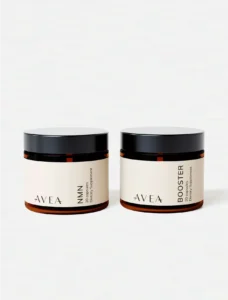
- All-star longevity ingredients like NMN, Resveratrol, CoQ10, and more.
- Promote healthier ageing at the cellular level.
- Maximise your energy production.
- Improve your mental clarity and focus.
Superior ingredient synergy with the Vitality Bundle
Whilst NMN is vital for maintaining NAD+ levels, its efficacy can be enhanced by targeting enzymes like CD38 and AMPK, which regulate NAD+ metabolism. The blend of ingredients in Avea’s Booster was carefully chosen for this purpose.
- Resveratrol activates SIRT1, enhancing mitochondrial function and longevity.
- Apigenin inhibits CD38, reducing NAD+ degradation.
- Pterostilbene, similar to Resveratrol, boosts SIRT1 activity and antioxidant defence.
- Betaine supports methylation processes, essential for NAD+ synthesis.
- CoQ10 and Nicotinamide enhance cellular energy production and protect against oxidative stress.
Together, these ingredients work synergistically with NMN to optimise NAD+ levels and support cellular health.
Enhancing your cellular energy cycle with our Vitality Bundle tackles the root issue: decreased efficiency of energy production due to mitochondrial decline and reduced levels of essential molecules like NAD+ and CoQ10.
Unlike the short-lived boost from coffee, this synergistic duo provides a steady, sustainable increase in energy by optimising your cellular function.
By 90 days, you’ll notice a continuous rise in vitality, feel more refreshed, and enjoy improved sleep quality. This holistic approach rejuvenates your body from within, ensuring you wake up energised, sustain peak performance throughout the day, and maintain clear cognitive function.
How do we test NAD+ levels?
Have you ever wondered about your NAD+ levels?
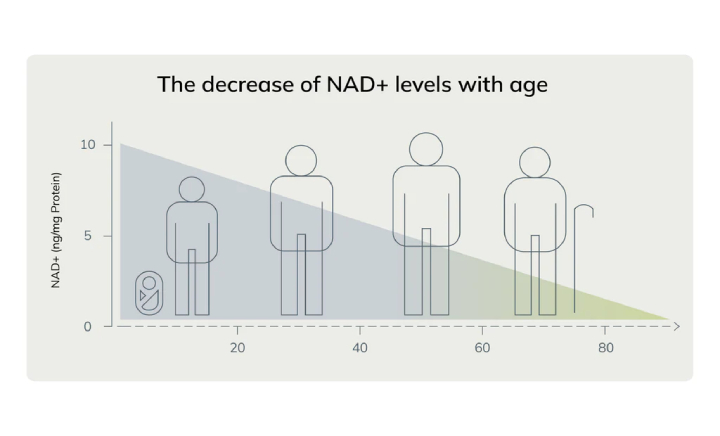
Understanding your NAD+ levels can provide valuable insights into your cellular health and potential risks for age-related diseases.
Accurate measurement of NAD+ levels helps in assessing how well your cells are functioning and the effectiveness of any interventions you might be undertaking.
Current methods for testing NAD+ levels
- Blood tests: Traditional blood tests measure NAD+ levels, but face challenges due to the instability of NAD+ in blood samples, making accurate measurement difficult.
- Dried Blood Spot Sampling (DBS): A significant advancement, this method involves spotting a small amount of blood on filter paper, which is then dried, extracted, and analysed. This technique is simple, requires minimal blood, and can be easily transported, making it ideal for both clinical and home settings.
- Urine tests: These tests can provide indirect measurements of NAD+ metabolism, though they may not be as precise as blood tests.
- Tissue biopsies: Used mainly in research, this invasive method offers detailed NAD+ measurements in specific tissues, but is not practical for routine testing.
Advances in NAD+ testing technology
The development of dried blood spot sampling represents a breakthrough in NAD+ testing, allowing for practical, reproducible measurements that can be performed conveniently.
This method is expected to become the gold standard, accelerating research and improving the monitoring of NAD+ supplementation effects.
Emerging portable point-of-care devices are also making NAD+ testing more accessible, enabling more frequent and routine monitoring of NAD+ levels.
